Law 314 - Constitutional Law Exam: Problem Question Analysis
VerifiedAdded on 2022/12/27
|8
|2056
|2
Homework Assignment
AI Summary
This assignment analyzes two key issues in Australian constitutional law. Part A examines the prolonged visa application process for asylum seekers, particularly focusing on the impact of the Migration Act 1958 and the Foreign Information Sharing Act 2010, as well as the detention of asylum seekers on Christmas Island and the mental health implications. Part B addresses the curtailment of free speech, specifically the legality of the NSW Safe Speech (Safe Universities) Act 2019 and its compatibility with the Commonwealth's Free Speech Protection Act 2019, in the context of a university's actions against a speaker. The assignment applies relevant laws, including the International Covenant on Civil and Political Rights (ICCPR), to the facts and concludes with legal arguments for each case.
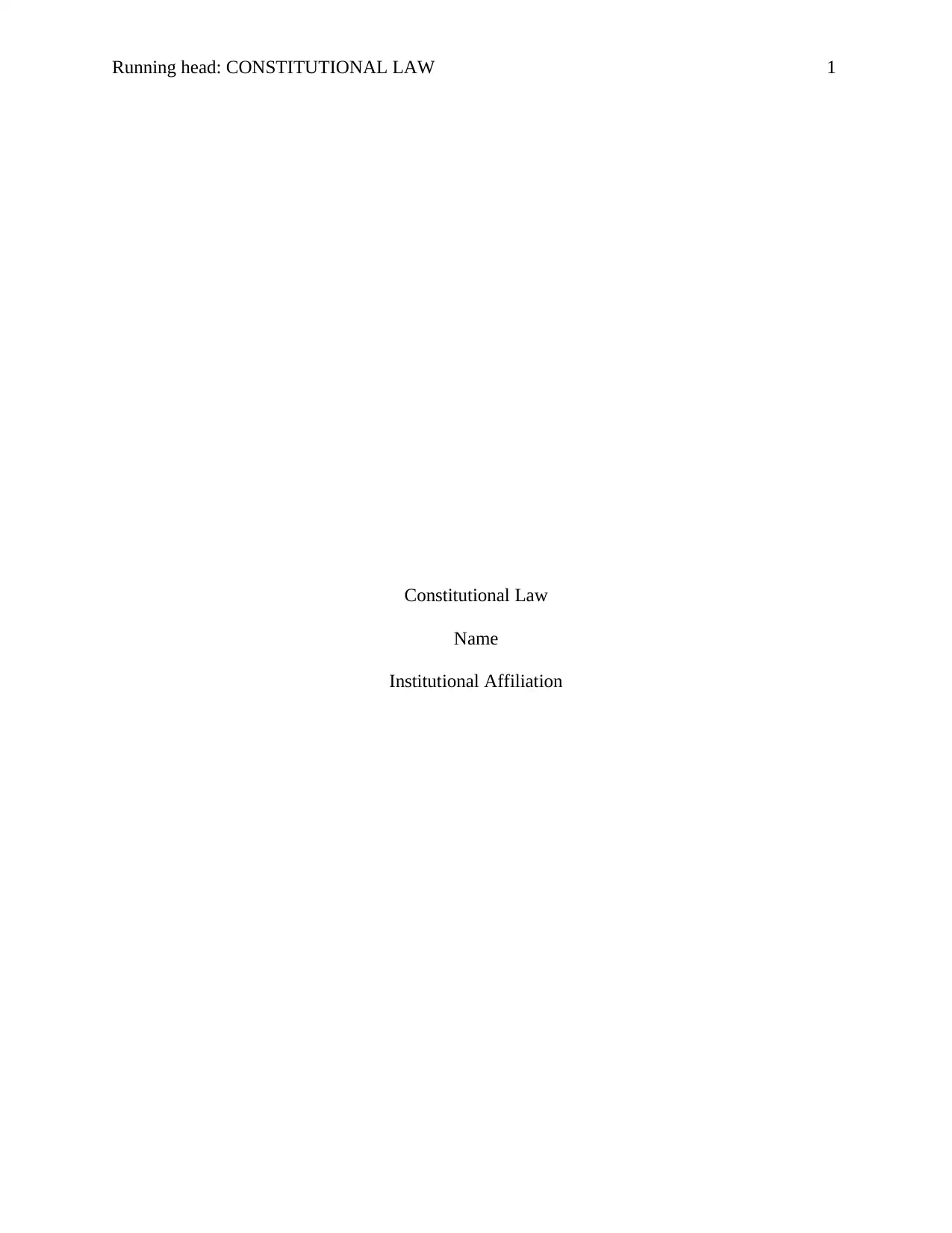
Running head: CONSTITUTIONAL LAW 1
Constitutional Law
Name
Institutional Affiliation
Constitutional Law
Name
Institutional Affiliation
Paraphrase This Document
Need a fresh take? Get an instant paraphrase of this document with our AI Paraphraser
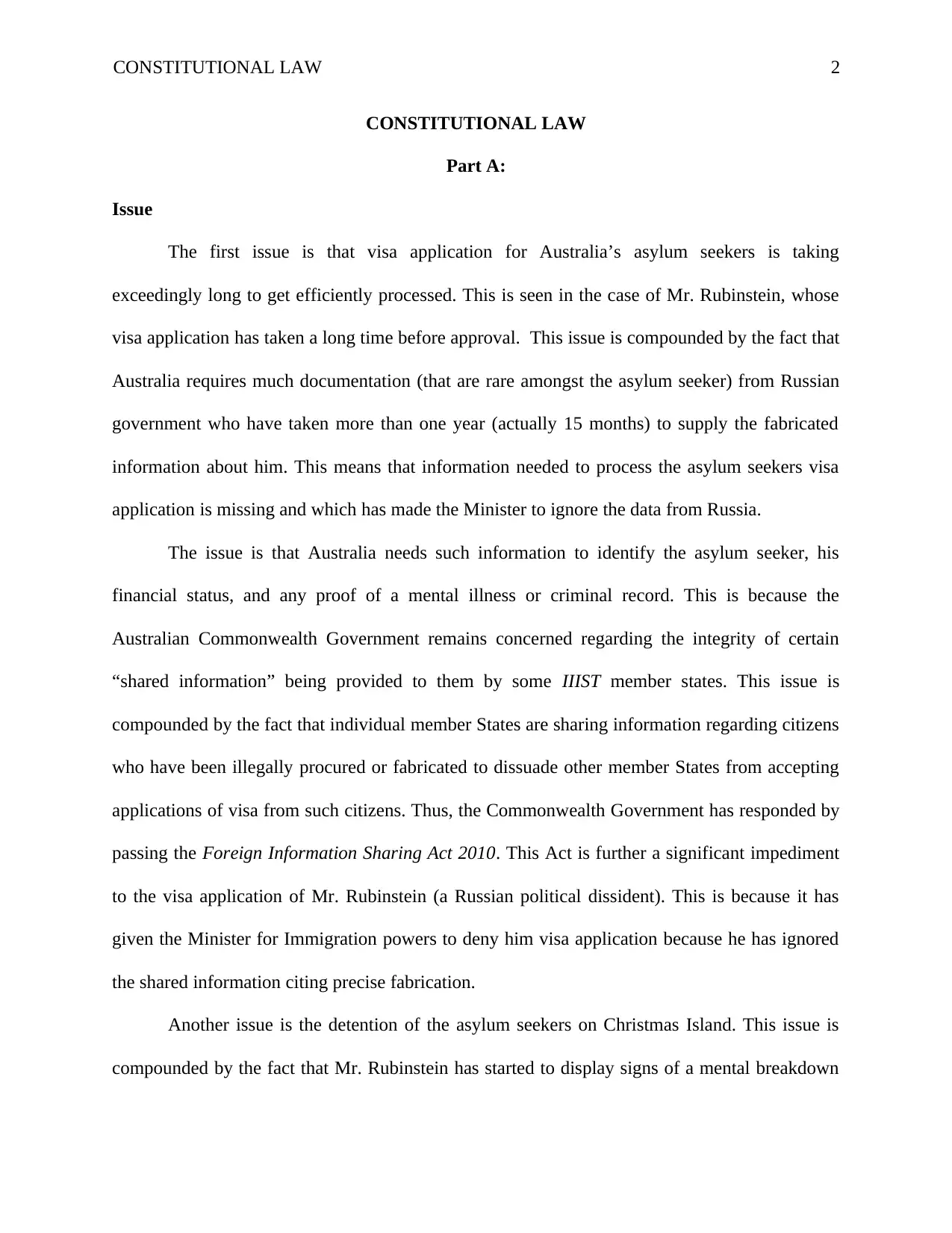
CONSTITUTIONAL LAW 2
CONSTITUTIONAL LAW
Part A:
Issue
The first issue is that visa application for Australia’s asylum seekers is taking
exceedingly long to get efficiently processed. This is seen in the case of Mr. Rubinstein, whose
visa application has taken a long time before approval. This issue is compounded by the fact that
Australia requires much documentation (that are rare amongst the asylum seeker) from Russian
government who have taken more than one year (actually 15 months) to supply the fabricated
information about him. This means that information needed to process the asylum seekers visa
application is missing and which has made the Minister to ignore the data from Russia.
The issue is that Australia needs such information to identify the asylum seeker, his
financial status, and any proof of a mental illness or criminal record. This is because the
Australian Commonwealth Government remains concerned regarding the integrity of certain
“shared information” being provided to them by some IIIST member states. This issue is
compounded by the fact that individual member States are sharing information regarding citizens
who have been illegally procured or fabricated to dissuade other member States from accepting
applications of visa from such citizens. Thus, the Commonwealth Government has responded by
passing the Foreign Information Sharing Act 2010. This Act is further a significant impediment
to the visa application of Mr. Rubinstein (a Russian political dissident). This is because it has
given the Minister for Immigration powers to deny him visa application because he has ignored
the shared information citing precise fabrication.
Another issue is the detention of the asylum seekers on Christmas Island. This issue is
compounded by the fact that Mr. Rubinstein has started to display signs of a mental breakdown
CONSTITUTIONAL LAW
Part A:
Issue
The first issue is that visa application for Australia’s asylum seekers is taking
exceedingly long to get efficiently processed. This is seen in the case of Mr. Rubinstein, whose
visa application has taken a long time before approval. This issue is compounded by the fact that
Australia requires much documentation (that are rare amongst the asylum seeker) from Russian
government who have taken more than one year (actually 15 months) to supply the fabricated
information about him. This means that information needed to process the asylum seekers visa
application is missing and which has made the Minister to ignore the data from Russia.
The issue is that Australia needs such information to identify the asylum seeker, his
financial status, and any proof of a mental illness or criminal record. This is because the
Australian Commonwealth Government remains concerned regarding the integrity of certain
“shared information” being provided to them by some IIIST member states. This issue is
compounded by the fact that individual member States are sharing information regarding citizens
who have been illegally procured or fabricated to dissuade other member States from accepting
applications of visa from such citizens. Thus, the Commonwealth Government has responded by
passing the Foreign Information Sharing Act 2010. This Act is further a significant impediment
to the visa application of Mr. Rubinstein (a Russian political dissident). This is because it has
given the Minister for Immigration powers to deny him visa application because he has ignored
the shared information citing precise fabrication.
Another issue is the detention of the asylum seekers on Christmas Island. This issue is
compounded by the fact that Mr. Rubinstein has started to display signs of a mental breakdown
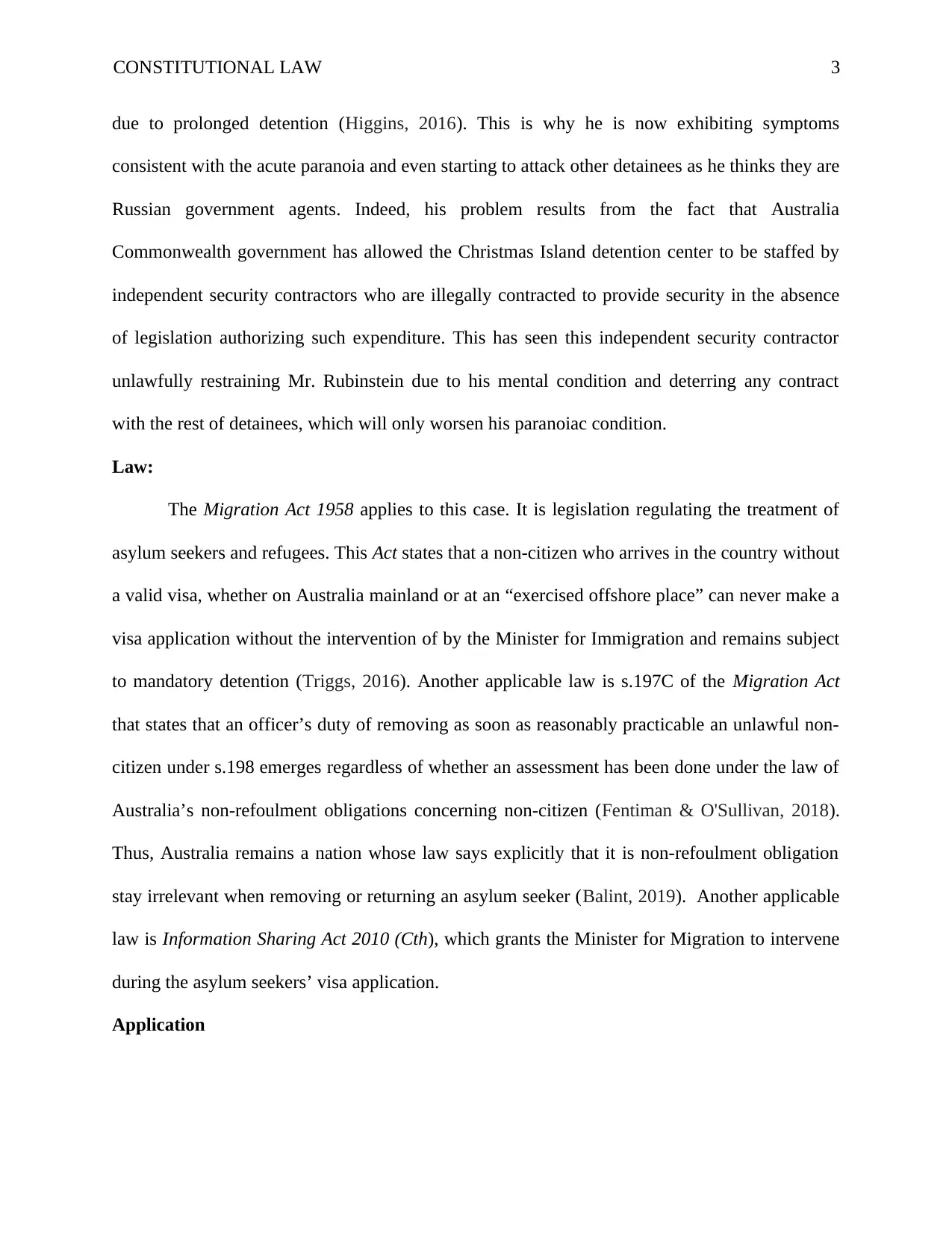
CONSTITUTIONAL LAW 3
due to prolonged detention (Higgins, 2016). This is why he is now exhibiting symptoms
consistent with the acute paranoia and even starting to attack other detainees as he thinks they are
Russian government agents. Indeed, his problem results from the fact that Australia
Commonwealth government has allowed the Christmas Island detention center to be staffed by
independent security contractors who are illegally contracted to provide security in the absence
of legislation authorizing such expenditure. This has seen this independent security contractor
unlawfully restraining Mr. Rubinstein due to his mental condition and deterring any contract
with the rest of detainees, which will only worsen his paranoiac condition.
Law:
The Migration Act 1958 applies to this case. It is legislation regulating the treatment of
asylum seekers and refugees. This Act states that a non-citizen who arrives in the country without
a valid visa, whether on Australia mainland or at an “exercised offshore place” can never make a
visa application without the intervention of by the Minister for Immigration and remains subject
to mandatory detention (Triggs, 2016). Another applicable law is s.197C of the Migration Act
that states that an officer’s duty of removing as soon as reasonably practicable an unlawful non-
citizen under s.198 emerges regardless of whether an assessment has been done under the law of
Australia’s non-refoulment obligations concerning non-citizen (Fentiman & O'Sullivan, 2018).
Thus, Australia remains a nation whose law says explicitly that it is non-refoulment obligation
stay irrelevant when removing or returning an asylum seeker (Balint, 2019). Another applicable
law is Information Sharing Act 2010 (Cth), which grants the Minister for Migration to intervene
during the asylum seekers’ visa application.
Application
due to prolonged detention (Higgins, 2016). This is why he is now exhibiting symptoms
consistent with the acute paranoia and even starting to attack other detainees as he thinks they are
Russian government agents. Indeed, his problem results from the fact that Australia
Commonwealth government has allowed the Christmas Island detention center to be staffed by
independent security contractors who are illegally contracted to provide security in the absence
of legislation authorizing such expenditure. This has seen this independent security contractor
unlawfully restraining Mr. Rubinstein due to his mental condition and deterring any contract
with the rest of detainees, which will only worsen his paranoiac condition.
Law:
The Migration Act 1958 applies to this case. It is legislation regulating the treatment of
asylum seekers and refugees. This Act states that a non-citizen who arrives in the country without
a valid visa, whether on Australia mainland or at an “exercised offshore place” can never make a
visa application without the intervention of by the Minister for Immigration and remains subject
to mandatory detention (Triggs, 2016). Another applicable law is s.197C of the Migration Act
that states that an officer’s duty of removing as soon as reasonably practicable an unlawful non-
citizen under s.198 emerges regardless of whether an assessment has been done under the law of
Australia’s non-refoulment obligations concerning non-citizen (Fentiman & O'Sullivan, 2018).
Thus, Australia remains a nation whose law says explicitly that it is non-refoulment obligation
stay irrelevant when removing or returning an asylum seeker (Balint, 2019). Another applicable
law is Information Sharing Act 2010 (Cth), which grants the Minister for Migration to intervene
during the asylum seekers’ visa application.
Application
⊘ This is a preview!⊘
Do you want full access?
Subscribe today to unlock all pages.

Trusted by 1+ million students worldwide
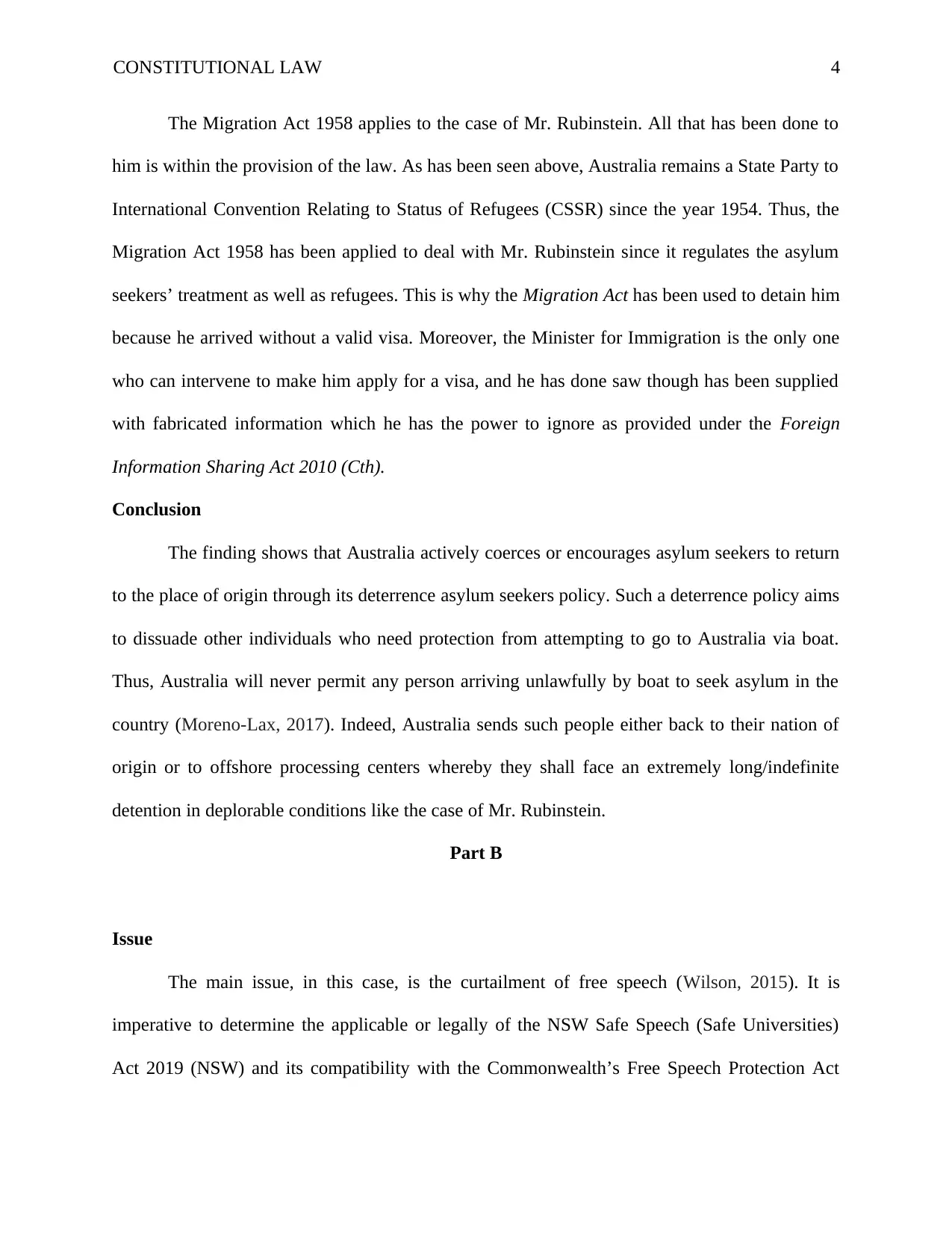
CONSTITUTIONAL LAW 4
The Migration Act 1958 applies to the case of Mr. Rubinstein. All that has been done to
him is within the provision of the law. As has been seen above, Australia remains a State Party to
International Convention Relating to Status of Refugees (CSSR) since the year 1954. Thus, the
Migration Act 1958 has been applied to deal with Mr. Rubinstein since it regulates the asylum
seekers’ treatment as well as refugees. This is why the Migration Act has been used to detain him
because he arrived without a valid visa. Moreover, the Minister for Immigration is the only one
who can intervene to make him apply for a visa, and he has done saw though has been supplied
with fabricated information which he has the power to ignore as provided under the Foreign
Information Sharing Act 2010 (Cth).
Conclusion
The finding shows that Australia actively coerces or encourages asylum seekers to return
to the place of origin through its deterrence asylum seekers policy. Such a deterrence policy aims
to dissuade other individuals who need protection from attempting to go to Australia via boat.
Thus, Australia will never permit any person arriving unlawfully by boat to seek asylum in the
country (Moreno-Lax, 2017). Indeed, Australia sends such people either back to their nation of
origin or to offshore processing centers whereby they shall face an extremely long/indefinite
detention in deplorable conditions like the case of Mr. Rubinstein.
Part B
Issue
The main issue, in this case, is the curtailment of free speech (Wilson, 2015). It is
imperative to determine the applicable or legally of the NSW Safe Speech (Safe Universities)
Act 2019 (NSW) and its compatibility with the Commonwealth’s Free Speech Protection Act
The Migration Act 1958 applies to the case of Mr. Rubinstein. All that has been done to
him is within the provision of the law. As has been seen above, Australia remains a State Party to
International Convention Relating to Status of Refugees (CSSR) since the year 1954. Thus, the
Migration Act 1958 has been applied to deal with Mr. Rubinstein since it regulates the asylum
seekers’ treatment as well as refugees. This is why the Migration Act has been used to detain him
because he arrived without a valid visa. Moreover, the Minister for Immigration is the only one
who can intervene to make him apply for a visa, and he has done saw though has been supplied
with fabricated information which he has the power to ignore as provided under the Foreign
Information Sharing Act 2010 (Cth).
Conclusion
The finding shows that Australia actively coerces or encourages asylum seekers to return
to the place of origin through its deterrence asylum seekers policy. Such a deterrence policy aims
to dissuade other individuals who need protection from attempting to go to Australia via boat.
Thus, Australia will never permit any person arriving unlawfully by boat to seek asylum in the
country (Moreno-Lax, 2017). Indeed, Australia sends such people either back to their nation of
origin or to offshore processing centers whereby they shall face an extremely long/indefinite
detention in deplorable conditions like the case of Mr. Rubinstein.
Part B
Issue
The main issue, in this case, is the curtailment of free speech (Wilson, 2015). It is
imperative to determine the applicable or legally of the NSW Safe Speech (Safe Universities)
Act 2019 (NSW) and its compatibility with the Commonwealth’s Free Speech Protection Act
Paraphrase This Document
Need a fresh take? Get an instant paraphrase of this document with our AI Paraphraser
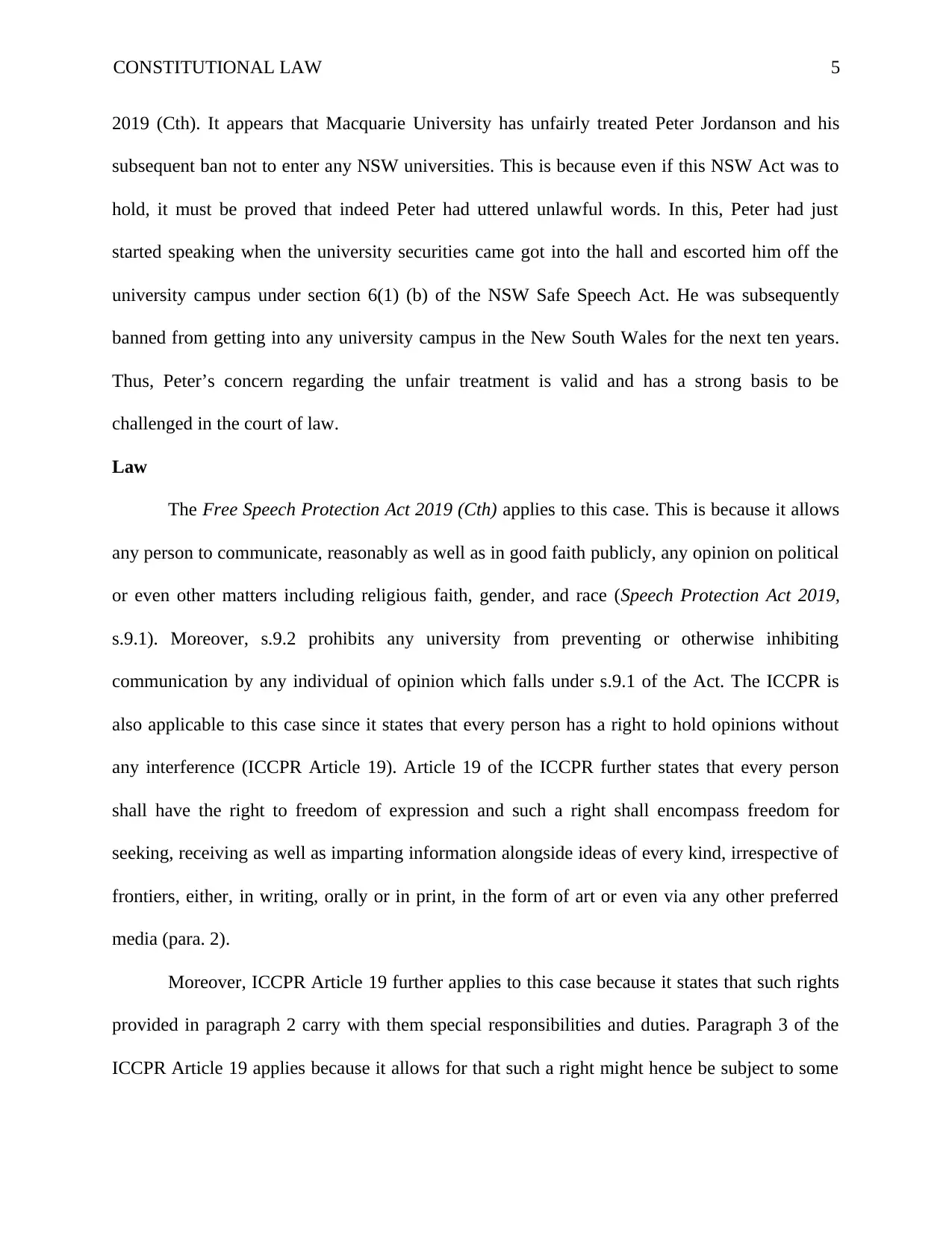
CONSTITUTIONAL LAW 5
2019 (Cth). It appears that Macquarie University has unfairly treated Peter Jordanson and his
subsequent ban not to enter any NSW universities. This is because even if this NSW Act was to
hold, it must be proved that indeed Peter had uttered unlawful words. In this, Peter had just
started speaking when the university securities came got into the hall and escorted him off the
university campus under section 6(1) (b) of the NSW Safe Speech Act. He was subsequently
banned from getting into any university campus in the New South Wales for the next ten years.
Thus, Peter’s concern regarding the unfair treatment is valid and has a strong basis to be
challenged in the court of law.
Law
The Free Speech Protection Act 2019 (Cth) applies to this case. This is because it allows
any person to communicate, reasonably as well as in good faith publicly, any opinion on political
or even other matters including religious faith, gender, and race (Speech Protection Act 2019,
s.9.1). Moreover, s.9.2 prohibits any university from preventing or otherwise inhibiting
communication by any individual of opinion which falls under s.9.1 of the Act. The ICCPR is
also applicable to this case since it states that every person has a right to hold opinions without
any interference (ICCPR Article 19). Article 19 of the ICCPR further states that every person
shall have the right to freedom of expression and such a right shall encompass freedom for
seeking, receiving as well as imparting information alongside ideas of every kind, irrespective of
frontiers, either, in writing, orally or in print, in the form of art or even via any other preferred
media (para. 2).
Moreover, ICCPR Article 19 further applies to this case because it states that such rights
provided in paragraph 2 carry with them special responsibilities and duties. Paragraph 3 of the
ICCPR Article 19 applies because it allows for that such a right might hence be subject to some
2019 (Cth). It appears that Macquarie University has unfairly treated Peter Jordanson and his
subsequent ban not to enter any NSW universities. This is because even if this NSW Act was to
hold, it must be proved that indeed Peter had uttered unlawful words. In this, Peter had just
started speaking when the university securities came got into the hall and escorted him off the
university campus under section 6(1) (b) of the NSW Safe Speech Act. He was subsequently
banned from getting into any university campus in the New South Wales for the next ten years.
Thus, Peter’s concern regarding the unfair treatment is valid and has a strong basis to be
challenged in the court of law.
Law
The Free Speech Protection Act 2019 (Cth) applies to this case. This is because it allows
any person to communicate, reasonably as well as in good faith publicly, any opinion on political
or even other matters including religious faith, gender, and race (Speech Protection Act 2019,
s.9.1). Moreover, s.9.2 prohibits any university from preventing or otherwise inhibiting
communication by any individual of opinion which falls under s.9.1 of the Act. The ICCPR is
also applicable to this case since it states that every person has a right to hold opinions without
any interference (ICCPR Article 19). Article 19 of the ICCPR further states that every person
shall have the right to freedom of expression and such a right shall encompass freedom for
seeking, receiving as well as imparting information alongside ideas of every kind, irrespective of
frontiers, either, in writing, orally or in print, in the form of art or even via any other preferred
media (para. 2).
Moreover, ICCPR Article 19 further applies to this case because it states that such rights
provided in paragraph 2 carry with them special responsibilities and duties. Paragraph 3 of the
ICCPR Article 19 applies because it allows for that such a right might hence be subject to some
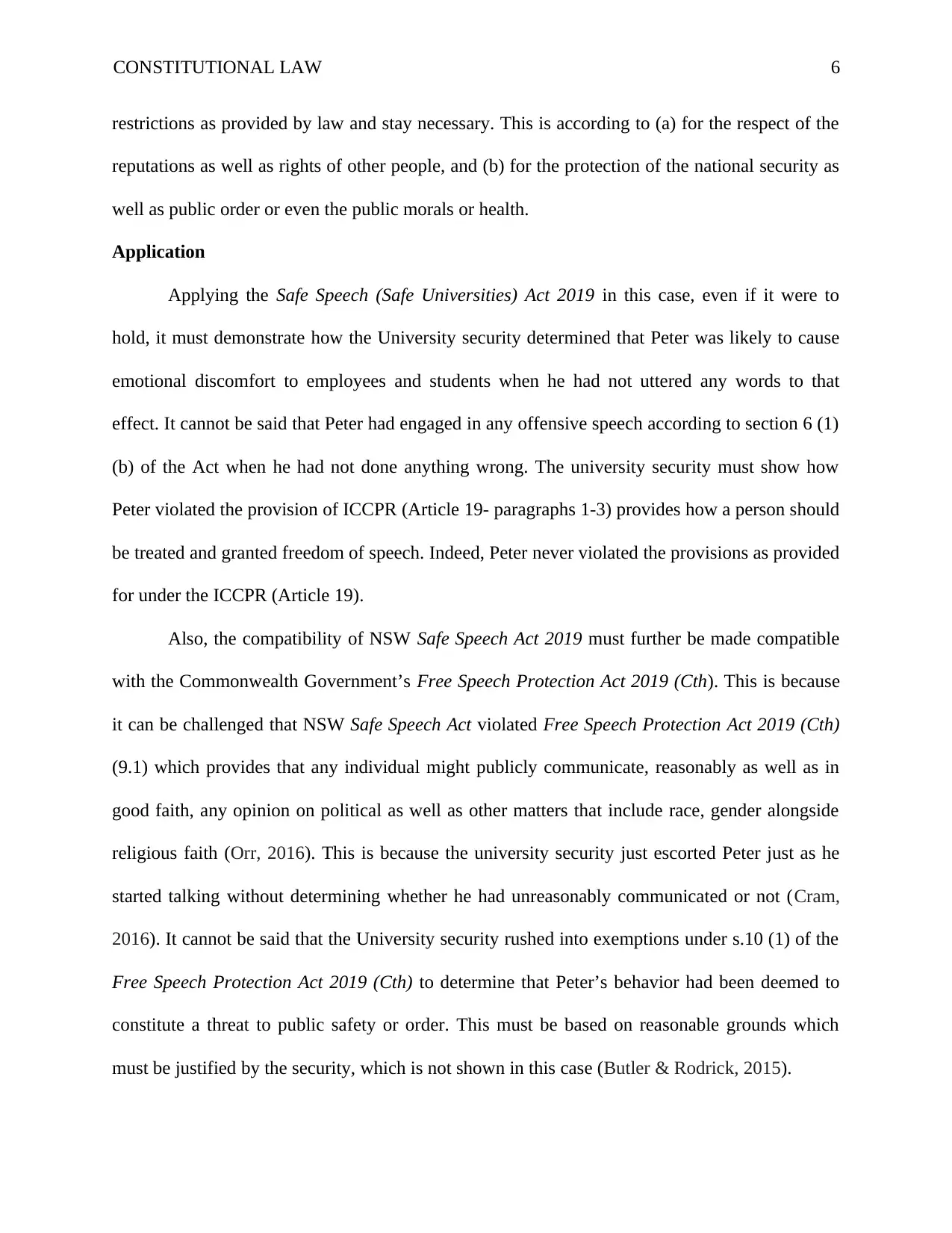
CONSTITUTIONAL LAW 6
restrictions as provided by law and stay necessary. This is according to (a) for the respect of the
reputations as well as rights of other people, and (b) for the protection of the national security as
well as public order or even the public morals or health.
Application
Applying the Safe Speech (Safe Universities) Act 2019 in this case, even if it were to
hold, it must demonstrate how the University security determined that Peter was likely to cause
emotional discomfort to employees and students when he had not uttered any words to that
effect. It cannot be said that Peter had engaged in any offensive speech according to section 6 (1)
(b) of the Act when he had not done anything wrong. The university security must show how
Peter violated the provision of ICCPR (Article 19- paragraphs 1-3) provides how a person should
be treated and granted freedom of speech. Indeed, Peter never violated the provisions as provided
for under the ICCPR (Article 19).
Also, the compatibility of NSW Safe Speech Act 2019 must further be made compatible
with the Commonwealth Government’s Free Speech Protection Act 2019 (Cth). This is because
it can be challenged that NSW Safe Speech Act violated Free Speech Protection Act 2019 (Cth)
(9.1) which provides that any individual might publicly communicate, reasonably as well as in
good faith, any opinion on political as well as other matters that include race, gender alongside
religious faith (Orr, 2016). This is because the university security just escorted Peter just as he
started talking without determining whether he had unreasonably communicated or not (Cram,
2016). It cannot be said that the University security rushed into exemptions under s.10 (1) of the
Free Speech Protection Act 2019 (Cth) to determine that Peter’s behavior had been deemed to
constitute a threat to public safety or order. This must be based on reasonable grounds which
must be justified by the security, which is not shown in this case (Butler & Rodrick, 2015).
restrictions as provided by law and stay necessary. This is according to (a) for the respect of the
reputations as well as rights of other people, and (b) for the protection of the national security as
well as public order or even the public morals or health.
Application
Applying the Safe Speech (Safe Universities) Act 2019 in this case, even if it were to
hold, it must demonstrate how the University security determined that Peter was likely to cause
emotional discomfort to employees and students when he had not uttered any words to that
effect. It cannot be said that Peter had engaged in any offensive speech according to section 6 (1)
(b) of the Act when he had not done anything wrong. The university security must show how
Peter violated the provision of ICCPR (Article 19- paragraphs 1-3) provides how a person should
be treated and granted freedom of speech. Indeed, Peter never violated the provisions as provided
for under the ICCPR (Article 19).
Also, the compatibility of NSW Safe Speech Act 2019 must further be made compatible
with the Commonwealth Government’s Free Speech Protection Act 2019 (Cth). This is because
it can be challenged that NSW Safe Speech Act violated Free Speech Protection Act 2019 (Cth)
(9.1) which provides that any individual might publicly communicate, reasonably as well as in
good faith, any opinion on political as well as other matters that include race, gender alongside
religious faith (Orr, 2016). This is because the university security just escorted Peter just as he
started talking without determining whether he had unreasonably communicated or not (Cram,
2016). It cannot be said that the University security rushed into exemptions under s.10 (1) of the
Free Speech Protection Act 2019 (Cth) to determine that Peter’s behavior had been deemed to
constitute a threat to public safety or order. This must be based on reasonable grounds which
must be justified by the security, which is not shown in this case (Butler & Rodrick, 2015).
⊘ This is a preview!⊘
Do you want full access?
Subscribe today to unlock all pages.

Trusted by 1+ million students worldwide
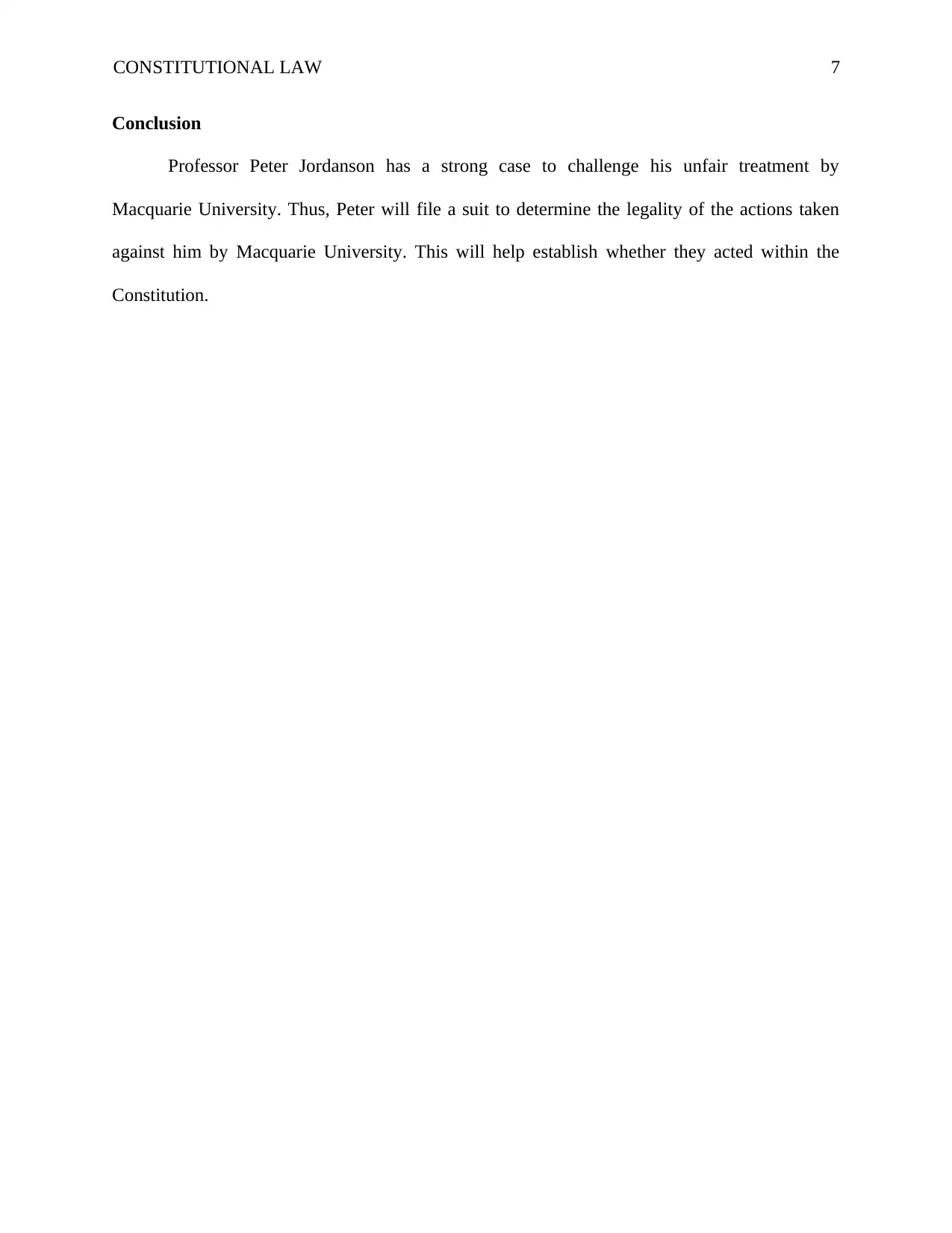
CONSTITUTIONAL LAW 7
Conclusion
Professor Peter Jordanson has a strong case to challenge his unfair treatment by
Macquarie University. Thus, Peter will file a suit to determine the legality of the actions taken
against him by Macquarie University. This will help establish whether they acted within the
Constitution.
Conclusion
Professor Peter Jordanson has a strong case to challenge his unfair treatment by
Macquarie University. Thus, Peter will file a suit to determine the legality of the actions taken
against him by Macquarie University. This will help establish whether they acted within the
Constitution.
Paraphrase This Document
Need a fresh take? Get an instant paraphrase of this document with our AI Paraphraser
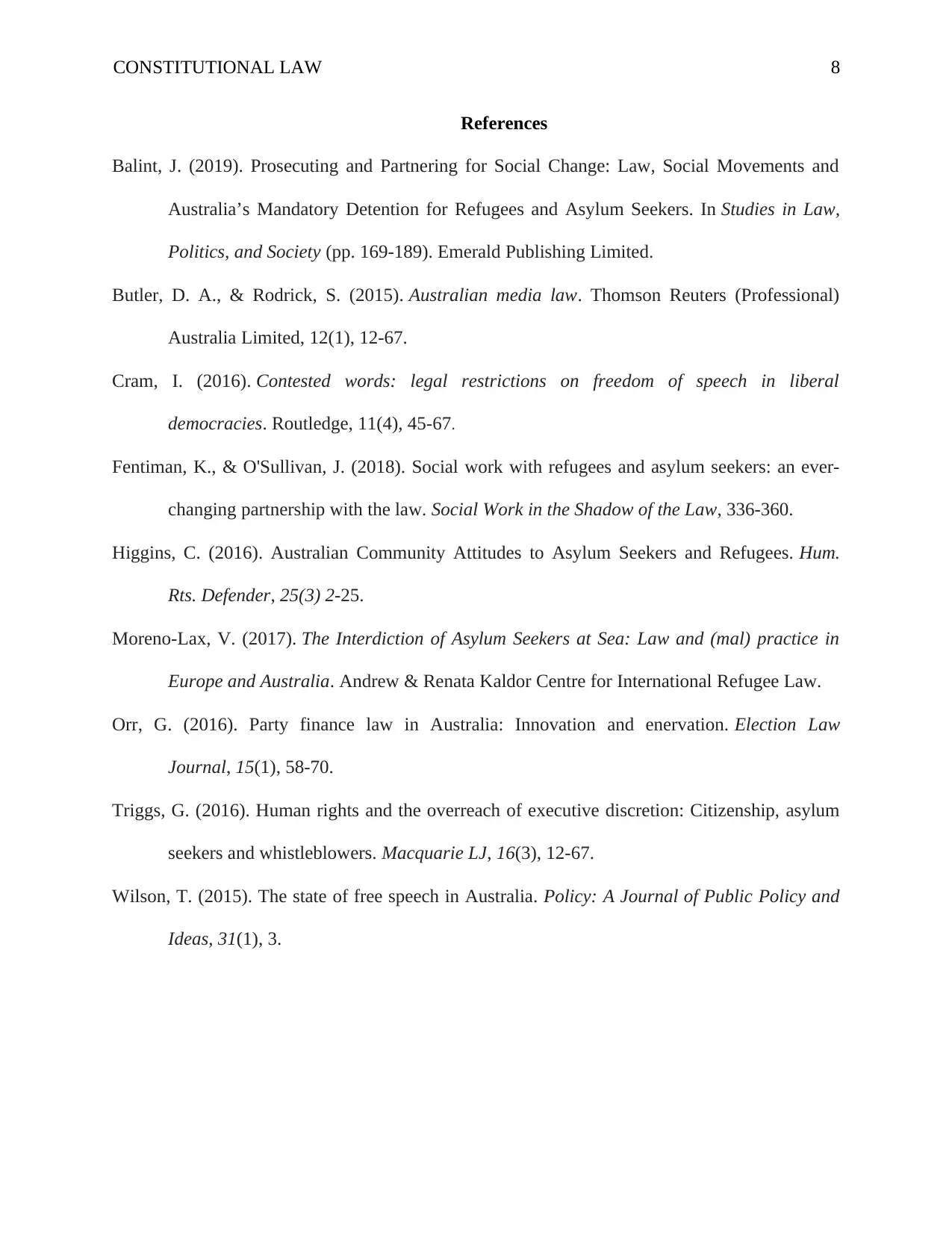
CONSTITUTIONAL LAW 8
References
Balint, J. (2019). Prosecuting and Partnering for Social Change: Law, Social Movements and
Australia’s Mandatory Detention for Refugees and Asylum Seekers. In Studies in Law,
Politics, and Society (pp. 169-189). Emerald Publishing Limited.
Butler, D. A., & Rodrick, S. (2015). Australian media law. Thomson Reuters (Professional)
Australia Limited, 12(1), 12-67.
Cram, I. (2016). Contested words: legal restrictions on freedom of speech in liberal
democracies. Routledge, 11(4), 45-67.
Fentiman, K., & O'Sullivan, J. (2018). Social work with refugees and asylum seekers: an ever-
changing partnership with the law. Social Work in the Shadow of the Law, 336-360.
Higgins, C. (2016). Australian Community Attitudes to Asylum Seekers and Refugees. Hum.
Rts. Defender, 25(3) 2-25.
Moreno-Lax, V. (2017). The Interdiction of Asylum Seekers at Sea: Law and (mal) practice in
Europe and Australia. Andrew & Renata Kaldor Centre for International Refugee Law.
Orr, G. (2016). Party finance law in Australia: Innovation and enervation. Election Law
Journal, 15(1), 58-70.
Triggs, G. (2016). Human rights and the overreach of executive discretion: Citizenship, asylum
seekers and whistleblowers. Macquarie LJ, 16(3), 12-67.
Wilson, T. (2015). The state of free speech in Australia. Policy: A Journal of Public Policy and
Ideas, 31(1), 3.
References
Balint, J. (2019). Prosecuting and Partnering for Social Change: Law, Social Movements and
Australia’s Mandatory Detention for Refugees and Asylum Seekers. In Studies in Law,
Politics, and Society (pp. 169-189). Emerald Publishing Limited.
Butler, D. A., & Rodrick, S. (2015). Australian media law. Thomson Reuters (Professional)
Australia Limited, 12(1), 12-67.
Cram, I. (2016). Contested words: legal restrictions on freedom of speech in liberal
democracies. Routledge, 11(4), 45-67.
Fentiman, K., & O'Sullivan, J. (2018). Social work with refugees and asylum seekers: an ever-
changing partnership with the law. Social Work in the Shadow of the Law, 336-360.
Higgins, C. (2016). Australian Community Attitudes to Asylum Seekers and Refugees. Hum.
Rts. Defender, 25(3) 2-25.
Moreno-Lax, V. (2017). The Interdiction of Asylum Seekers at Sea: Law and (mal) practice in
Europe and Australia. Andrew & Renata Kaldor Centre for International Refugee Law.
Orr, G. (2016). Party finance law in Australia: Innovation and enervation. Election Law
Journal, 15(1), 58-70.
Triggs, G. (2016). Human rights and the overreach of executive discretion: Citizenship, asylum
seekers and whistleblowers. Macquarie LJ, 16(3), 12-67.
Wilson, T. (2015). The state of free speech in Australia. Policy: A Journal of Public Policy and
Ideas, 31(1), 3.
1 out of 8
Related Documents
Your All-in-One AI-Powered Toolkit for Academic Success.
+13062052269
info@desklib.com
Available 24*7 on WhatsApp / Email
![[object Object]](/_next/static/media/star-bottom.7253800d.svg)
Unlock your academic potential
Copyright © 2020–2026 A2Z Services. All Rights Reserved. Developed and managed by ZUCOL.





